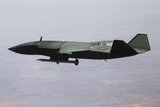Alpha UASs feature robust GNSS-denied navigation capability
UAV Navigation is providing its Vector-600 autopilot for the Alpha 800 and Alpha 900 UAS. (Photo: UAV Navigation)
Alpha Unmanned Systems has selected a robust GNSS-denied navigation capability from long-term partner UAV Navigation for the Alpha 800 and Alpha 900 rotary-wing UAS.
UAV Navigation is providing its Vector-600 autopilot that would enable the Alpha 800 and Alpha 900 to continue a mission if the GNSS satellite signal becomes unavailable or is jammed.
Vector-600 is able to estimate the UAV's position and follow a flight plan, or alternatively receive a command to fly to a designated area - including the landing site, even if the UAV is BLoS.
The military-grade autopilot can continue the mission even if subjected to intrusion, jamming, interference or meaconing (a term referring to the interception and rebroadcast of navigation signals).
Alvaro Escarpenter, COO at Alpha Unmanned Systems, stated on 7 June that ‘dead-reckoning’ capabilities enabled by Vector-600 mean that UAS operators can disable GNSS ‘for a limited amount of time, or we can escape out of a jammed area, in order to correct our position and attempt to recover the GNSS signal; if the worst comes to the worst, then we know we will be able to save the UAV’.
Related Equipment in Defence Insight
More from Digital Battlespace
-
![World Defense Show 2026: Northrop Grumman to present improved C2 management system]()
World Defense Show 2026: Northrop Grumman to present improved C2 management system
The Northrop Grumman Integrated Battle Command System is in service with Poland and the US Army with another 20 countries believed to have expressed an interest.
-
![Thales looks to boost DigitalCrew system through AI and human-machine teaming trials]()
Thales looks to boost DigitalCrew system through AI and human-machine teaming trials
The Thales DigitalCrew package, first unveiled at last year’s Defence IQ International Armoured Vehicles conference, is designed to merge imaging and apply a layer of decision-making and observation algorithms to support crew and other personnel.
-
![Babcock nears first customer for Nomad AI translation tool]()
Babcock nears first customer for Nomad AI translation tool
Nomad can provide militaries with real-time intelligence, saving critical time on the battlefield.
-
![AUSA 2025: Israel’s Asio Technologies to supply hundreds of improved Taurus tactical systems]()
AUSA 2025: Israel’s Asio Technologies to supply hundreds of improved Taurus tactical systems
Taurus operates alongside the Israel Defense Forces’ Orion system which supports mission management across tens of thousands of manoeuvring forces, from squad leaders to battalion commanders.
-
![AUSA 2025: Kopin pushes micro-LED plans as China moves faster]()
AUSA 2025: Kopin pushes micro-LED plans as China moves faster
The plan for the new displays follows fresh investment in Kopin’s European facilities by Theon and an order for head-up displays in fielded aircraft, with funding from the US Department of Defense.
-
![AUSA 2025: Persistent Systems to complete its largest order by year’s end]()
AUSA 2025: Persistent Systems to complete its largest order by year’s end
Persistent Systems received its largest ever single order for its MPU5 devices and other systems earlier this month and has already delivered the 50 units to the US Army’s 4th Infantry Division.


























